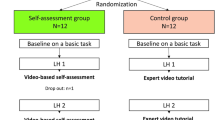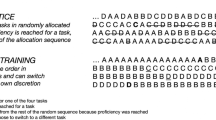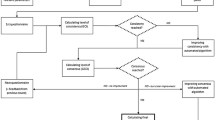Abstract
Background
Laparoscopic novices begin at different performance levels, and studies on tailored training concepts are warranted. The effect of verbal instructor feedback has been investigated with varying results, and its effectiveness in virtual-reality laparoscopic (VRL) simulations still is unclear. This study aimed to determine whether laparoscopic novices with lower initial performance statuses may profit from training with intensive instructor feedback.
Methods
A prospective, single-blinded study was performed within a week-long curricular course. In this study, 20 medical students performed a complex bimanual maneuver on a VRL simulator. There was a division in performance levels, with a high-performer group (HPG) that received a better median score and a low-performer group (LPG). During the training phase, only the initial LPG received standardized instructor feedback in a one-to-one setting. The final assessment of skills for both groups involved performing the task without feedback at the end of the course.
Results
The HPG and LPG showed significantly different initial performance levels according global and categorized (time, economics, error) scores (p < 0.005). This difference disappeared quickly throughout the instructor feedback phase. The final assessment demonstrated that both groups were at the same level of performance.
Conclusion
This is the first study to use a tailored training concept with instructor feedback limited to the LPG. The tailored training was effective and economic for the laparoscopic novices and their teachers.


Similar content being viewed by others
References
Grantcharov TP, Bardram L, Funch-Jensen P, Rosenberg J (2003) Learning curves and impact of previous operative experience on performance on a virtual reality simulator to test laparoscopic surgical skills. Am J Surg 185:146–149
Gurusamy KS, Aggarwal R, Palanivelu L, Davidson BR (2009) Virtual reality training for surgical trainees in laparoscopic surgery. Cochrane Database Syst Rev (1):CD006575
Larsen CR, Soerensen JL, Grantcharov TP, Dalsgaard T, Schouenborg L, Ottosen C, Schroeder TV, Ottesen BS (2009) Effect of virtual reality training on laparoscopic surgery: randomised controlled trial. BMJ 338:b1802
Satava RM (1993) Virtual reality surgical simulator: the first steps. Surg Endosc 7:203–205
Grantcharov TP, Funch-Jensen P (2009) Can everyone achieve proficiency with the laparoscopic technique? Learning curve patterns in technical skills acquisition. Am J Surg 197:447–449
Paschold M, Niebisch S, Kronfeld K, Herzer M, Lang H, Kneist W (2013) Cold-start capability in virtual-reality laparoscopic camera navigation: a base for tailored training in undergraduates. Surg Endosc 27(6):2169–2177
Paschold M, Schroder M, Kauff DW, Gorbauch T, Herzer M, Lang H, Kneist W (2011) Virtual reality laparoscopy: which potential trainee starts with a higher proficiency level? Int J Comput Assist Radiol Surg 6:653–662
Halvorsen FH, Fosse E, Mjaland O (2011) Unsupervised virtual reality training may not increase laparoscopic suturing skills. Surg Laparosc Endosc Percutan Tech 21:458–461
Bonrath EM, Fritz M, Mees ST, Weber BK, Grantcharov TP, Senninger N, Rijcken E (2013) Laparoscopic simulation training: does timing impact the quality of skills acquisition? Surg Endosc 27:888–894
Palter VN (2011) Comprehensive training curricula for minimally invasive surgery. J Grad Med Educ 3:293–298
Zendejas B, Brydges R, Hamstra SJ, Cook DA (2013) State of the evidence on simulation-based training for laparoscopic surgery: a systematic review. Ann Surg 257:586–593
Vapenstad C, Buzink SN (2013) Procedural virtual reality simulation in minimally invasive surgery. Surg Endosc 27:364–377
Snyder CW, Vandromme MJ, Tyra SL, Hawn MT (2009) Proficiency-based laparoscopic and endoscopic training with virtual reality simulators: a comparison of proctored and independent approaches. J Surg Educ 66:201–207
Strandbygaard J, Bjerrum F, Maagaard M, Winkel P, Larsen CR, Ringsted C, Gluud C, Grantcharov T, Ottesen B, Sorensen JL (2013) Instructor feedback versus no instructor feedback on performance in a laparoscopic virtual reality simulator: a randomized trial. Ann Surg 257:839–844
Stefanidis D, Korndorffer JR Jr, Heniford BT, Scott DJ (2007) Limited feedback and video tutorials optimize learning and resource utilization during laparoscopic simulator training. Surgery 142:202–206
O’Connor A, Schwaitzberg SD, Cao CG (2008) How much feedback is necessary for learning to suture? Surg Endosc 22:1614–1619
Rosser JC Jr, Colsant BJ, Lynch PJ, Herman B, Klonsky J, Young SM (2006) The use of a “hybrid” trainer in an established laparoscopic skills program. JSLS 10:4–10
Boyle E, Al-Akash M, Gallagher AG, Traynor O, Hill AD, Neary PC (2011) Optimising surgical training: use of feedback to reduce errors during a simulated surgical procedure. Postgrad Med J 87:524–528
Disclosures
M. Paschold, T. Huber, S. R. Zeißig, H. Lang, and W. Kneist have no conflicts of interest or financial ties to disclose.
Author information
Authors and Affiliations
Corresponding author
Rights and permissions
About this article
Cite this article
Paschold, M., Huber, T., Zeißig, S.R. et al. Tailored instructor feedback leads to more effective virtual-reality laparoscopic training. Surg Endosc 28, 967–973 (2014). https://doi.org/10.1007/s00464-013-3258-z
Received:
Accepted:
Published:
Issue Date:
DOI: https://doi.org/10.1007/s00464-013-3258-z




